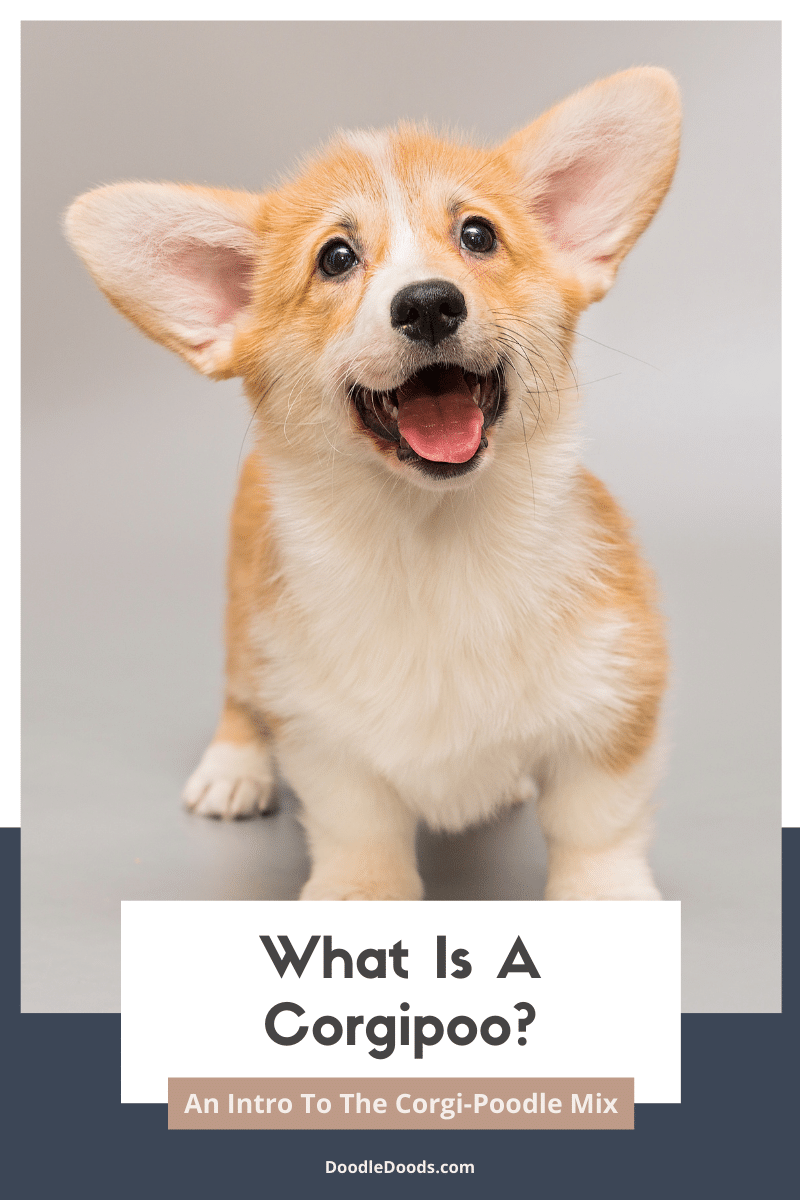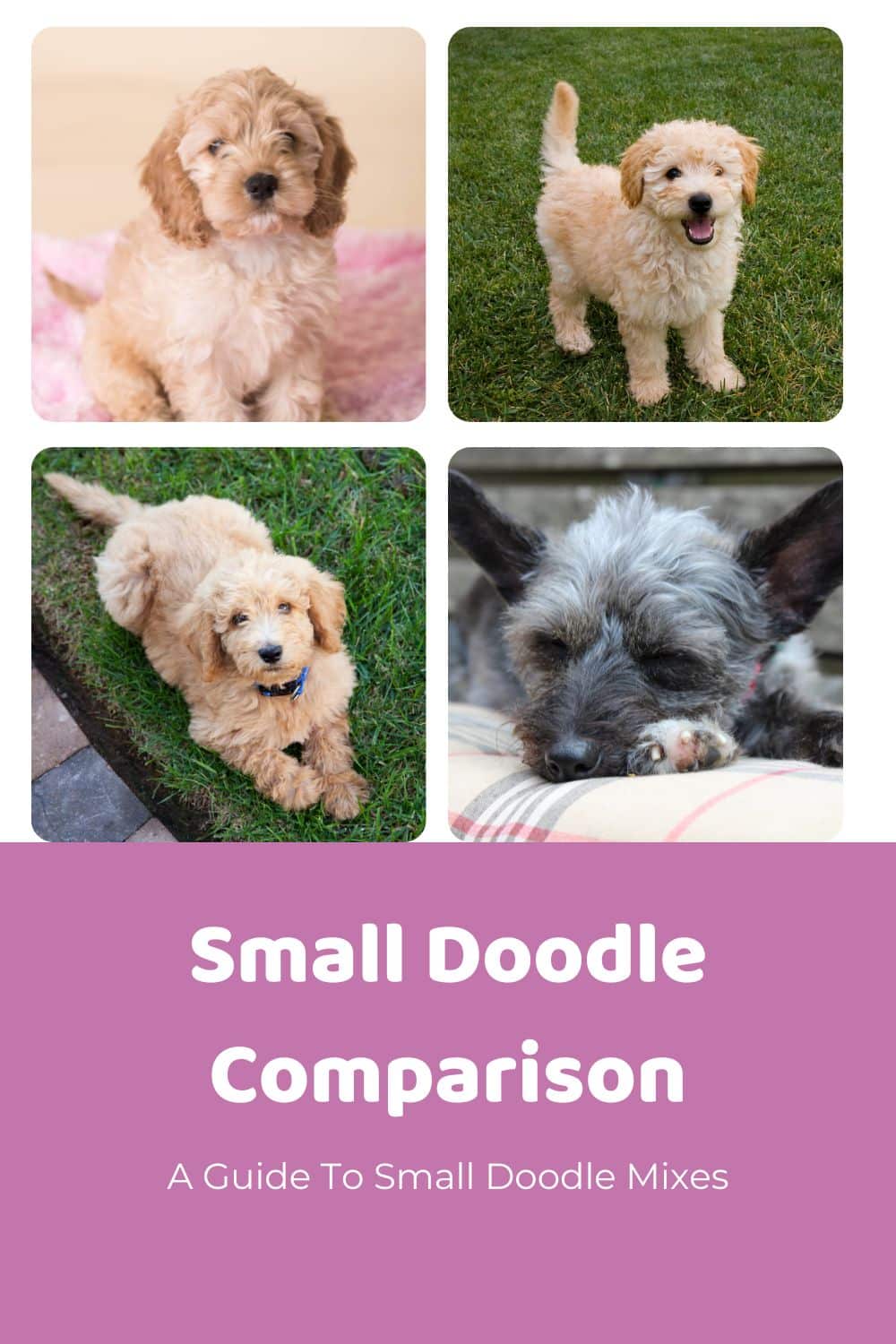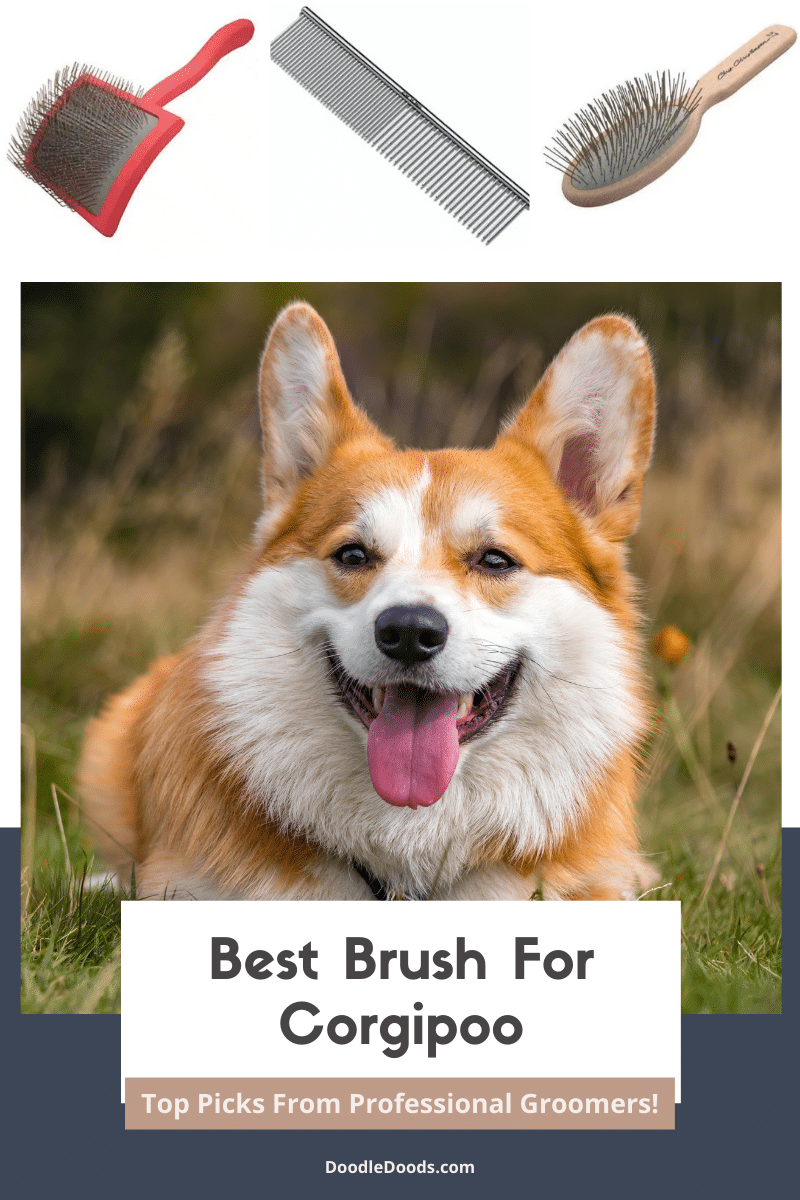Corgipoo, also known as Corgidoodle, is one of those ‘designer breeds’ that simply cannot be missed. In this guide, you’ll learn every single detail you need to know about the Corgi-Poodle mix. We’ll start with the basics – their background, looks, and size, and then move onto the nitty-gritty stuff, such as their grooming needs, common health issues, and exercise and training requirements, to name a few. Keep on reading to learn all about the Corgipoo!
Table of Contents
- What Is A Corgipoo?
- Physical Appearance
- Corgidoodle Pictures (Puppy & Adult)
- Corgipoo Size
- Variations & Generations
- Personality & Temperament
- Corgipoo Health
- Exercise & Training
- Corgipoo Coat Care & Grooming
- Where Can You Get Corgipoo Puppies?
- Corgipoo 101: Frequently Asked Questions
What Is A Corgipoo?
A Corgipoo is a crossbreed of the Welsh Pembroke Corgi and Poodle. Fun-loving, affectionate, and fiercely loyal, Corgipoos are perfect pets for active people looking for a smaller-sized pup.
The Corgi-Poodle mix is definitely one of those up and coming hybrid breeds that not many people have had the honor to meet yet. But if you do, it’s guaranteed you can’t get enough of this amazingly cute little Dood!
The fabulous Poodle, the father of all Doodles (quite literally), will never go unnoticed with its endearing personality and stylish looks. Poodles have been around for centuries and they initially originated from Germany, where they were bred as water hunting dogs. That’s actually why Poodles started sporting those insanely intricate hairdos – to help keep their most vulnerable body parts warm from the cold elements.
The Pembroke Welsh Corgi, simply known as the Corgi, is another highly popular purebred dog in its own right. Corgis have also been around for centuries, and these pups were also beloved companions for the late Queen Elizabeth II since her early childhood.
For the Corgi-Poodle mix, the most commonly used Corgi is the Pembroke Welsh Corgi. But if you’re really lucky, you may also come across the Cardigan Welsh Corgi-Poodle mix.
Physical Appearance
As with any other crossbreed, Corgipoos combine the looks of both the Poodle and purebred Corgi. They’re usually quite muscular, yet small dogs with longer bodies like the Corgis have. They also have the signature floppy Doodle ears with a round head and medium-length muzzle.
Colors
Corgipoos can inherit an array of different coat colors and patterns from their parents, from fawn to cream, and even to the darkest black coat with lighter markings. It all boils down to their genetics and which traits are more dominant.
The purebred Corgi usually comes in just four coat colors – black and tan, fawn, red, and sable. Meanwhile, Poodles come in a much larger variety of solid coat colors and patterns. Some of them include black, brown, silver and gray, cream, reddish hues like apricot and red, or white. In addition to that, Poodles can often come in fun patterns of all of these colors. Ultimately, this depends on what the breeder specializes in and what genes are present in the parent dogs.
Coat, Shedding, & Hypoallergenic Level
Like most Poodle mixes, Corgipoos come with thick coats that can range from curly to wavy to straight. They tend to have that typical shaggy, fluffy Doodle look. But ultimately their coat type depends on what they inherit from each side of their lineage.
As you probably know, Poodle mixes were initially created to achieve hypoallergenic guide dogs. Most of the time, reputable breeders also aim to breed low to non-shedding and allergy-friendly Corgidoodles. However, this doesn’t necessarily mean that all Corgipoos are no-shed dogs.
To gain a deeper understanding of this, we must take into account their heritage. The Poodle is notorious for its hypoallergenic coat that only has a single layer of fur. In contrast to double-coated breeds, they don’t have a shedding undercoat. Another great thing about the Poodle’s curly coat is that it’s so dense and textured that it traps in any loose hair that would otherwise fall out. For this reason, Poodles truly are great for people with allergies.
On the other side of the equation we have the Corgi – a double-coated breed that sheds all year round and quite heavily twice a year. As you can imagine, sometimes these genetics are more dominant. This means that some Corgipoos may very well inherit a straight coat with a shedding undercoat.
Nonetheless, reputable breeders usually try to minimize the shedding potential of their pups, and aim to breed wavy and curly-coated Corgipoos that are much more allergy-friendly. While curly-coated Corgipoos are typically single-layered and the most hypoallergenic of them all, the wavy-coated pups may sometimes come with a lightly shedding undercoat.
Corgidoodle Pictures (Puppy & Adult)
We know that both Poodles and Corgis are unbearably adorable in their ‘original form’. But what happens when we combine these two purebreds? Take a look for yourself:
| Black and White Corgipoo | @penny.corgipoo |
| Tan and White Corgipoo | @henry_the_corgipoo |
Corgipoo Size
The Corgipoo is a small-sized dog with its weight ranging between 12 and 25 pounds. They usually stand about 8 to 13 inches tall at the shoulder. They’re created with Toy or Miniature Poodles – the former resulting in a smaller Corgipoo, and the latter producing a litter of slightly larger Corgipoos.
How big will a Corgidoodle get exactly, then? Here’s a helpful Corgipoo size chart for your reference:
| Toy/Mini Corgipoo | Mini/Standard Corgipoo | |
| Weight | Up to 15 pounds | 15-25 pounds |
| Height | Up to 10 inches | 10-13 inches |
| When Full-Grown? | 11-13 months | 11-13 months |
*A dog’s height is measured from the withers, which is the highest part of their shoulder blades.
As with any crossbreed, it can be difficult to predict how big a Corgipoo pup gets, especially if the parent dogs are very different in terms of their size. Still, we can get a pretty good idea of what’s to come by looking at the Corgidoodle’s parents.
Purebred Corgis are easily distinguishable with their short and stumpy legs, long body, and relatively low height. Although Corgis only grow up to 10 to 12 inches in height, they’re actually rather heavy considering their 22 to 30 pound average weight. Nonetheless, these pups fall into the small to medium-sized breed category.
On the other hand, Poodles come in three different size categories – Standard, Miniature, and Toy. For the Corgi-Poodle mix, the obvious picks are the smaller varieties, so Mini and Toy Poodles. The Miniature Poodle weighs 10 to 20 pounds on average, whereas the tiny Toy Poodle can weigh as little as 4 pounds and up to 12 pounds. Minis usually stand around 10 to 15 inches tall and Toys stay below 10 inches.
Variations & Generations
In addition to the Toy and Mini Corgidoodle varieties, these pups can also come in different generations. What’s that, you may ask? Now, this topic can be confusing to many at first, but let’s break it down for you.
When talking about hybrid breeds, there are actually more than one way to produce a litter of crossbreed puppies. There’s the very first-generation, or F1 Corgipoo that’s the direct result of crossing a purebred Corgi to a purebred Poodle. But then there are many other varieties that breeders can achieve. For instance, by breeding an F1 Corgipoo back to a Poodle, we get an F1b, or first-generation backcross Corgipoo.
What makes it interesting is that with each generation the outcome can vary. Naturally, the more we backcross a Corgipoo back to a Poodle, the more traits they’ll inherit from the Poodle as well. This applies to their size, coat type, potential for shedding, even their personality!
Here’s an overview of all the possible Corgipoo generations and how each of them is different from the other:
| 1st Parent | 2nd Parent | % Corgi* | % Poodle* | |
| F1 Corgipoo (first-generation) | Corgi | Poodle | 50% | 50% |
| F1B Corgipoo (first-generation backcross) | F1 Corgipoo | Poodle | 25% | 75% |
| F1BB Corgipoo (first-generation backcross backcross) | F1B Corgipoo | Poodle | 12.5% | 87.5% |
| F2 Corgipoo (second-generation) | F1 Corgipoo | F1 Corgipoo | 50% | 50% |
| F2B Corgipoo (second-generation backcross) | F1 Corgipoo | F1B Corgipoo | 37.5% | 62.5% |
| F2B Corgipoo (alternate cross) | F2 Corgipoo | Poodle | 25% | 75% |
| F3 / Multigen Corgipoo | F1B Corgipoo or higher | F1B Corgipoo or higher | Varies | Varies |
*These are generic calculations only – genetics are rarely mathematically accurate.

Personality & Temperament
Corgipoos are lively, social, loving, and loyal dogs that are just an absolute joy to be around. They can also be quite mischievous and they’ll never cease to amaze with their fun antics. They’re also quite energetic, which means that these Doods need plenty of mental and physical stimulation to keep them healthy and happy.
Speaking of which, Corgipoos are also very intelligent and eager to please. Although this makes training them a total breeze, it also means that they do need to put their great minds to good use. This will prevent undesired behaviors and overall keep your pup’s stress levels at a minimum.
As sweet-natured, loyal, and friendly as they are, there can also be a downside to this. Namely, Corgipoos can sometimes be prone to separation anxiety. For this reason, spending long hours home alone is a no-go for them. They are lovey-dovey dogs that adore spending time with their beloved family members above all else.
The Corgi-Poodle mix is also very bold and tenacious, and can get protective of its family. Sometimes they even have a stubborn streak, but with gentle guidance and proper socialization this shouldn’t become a problem.
For obvious reasons, you might be wondering – are Corgipoos aggressive? The great thing is that your Corgidoodle pup shouldn’t show any signs of aggression as long as they’ve been properly socialized, trained, desensitized, and cared for.
However, don’t be surprised if your Corgipoo has a habit of vocalizing their wants and needs with you. The Corgipoo can sometimes be a bit of a barker, but it’s usually nothing too over the top. In case a Corgipoo does have an issue with barking, positive reinforcement training methods can help you tackle this issue.
Corgipoo Health
Although generally healthy dogs, Corgipoos can be prone to health conditions like hip and elbow dysplasia, cataracts and progressive retinal atrophy (PRA), and Von Willebrand’s Disease. They’re also at risk of certain heart conditions and degenerative myelopathy, which is a serious spinal cord condition.
Fortunately, with proper DNA screening of the breeding dogs and afterwards providing a healthy lifestyle for your pooch, these conditions can be prevented to some extent. Feeding your dog a healthy and nutritionally balanced diet, providing plenty of daily exercise, taking them to routine vet checkups, and spoiling them with all the kisses and cuddles will go a long way.
Then there are also those less serious conditions that are common in all Doodles, such as allergies and sensitivities, often manifesting as skin and coat issues or digestive problems. Corgipoos are also prone to ear infections. That’s down to the fact that their floppy ears restrict proper air flow and the bad bacteria can quickly start to spread.
What’s great about hybrid breeds is that they’re said to benefit from hybrid vigor. Hybrid vigor indicates that crossbreeds are thought to inherit superior genetics from both sides of their lineage. This should ideally minimize health conditions that are most common in each side of their purebred parents. On the other hand, hybrid vigor usually starts to diminish with each consecutive generation, especially if the majority of the pups’ genetic makeup comes from one side of their lineage.
In terms of the Corgipoo’s lifespan, we can expect them to live around 12 to 15 years on average. Sometimes even longer than that! As a general rule of thumb, smaller dogs tend to have longer lives. So it’s not uncommon for smaller Toy Corgipoos to even outlive already fun-sized Mini Corgipoos.
Exercise & Training
Thanks to their high levels of intelligence and natural eagerness to please, Corgipoos are usually easy to train. After all, both Poodles and Corgis are brainy lil’ dogs, the Poodle outshining many other purebreds even!
Even so, positive reinforcement training methods and early socialization will play a huge role when raising your puppy into a well-behaved adult. A sure fire way to raise a well-rounded Corgipoo is to start with obedience training, potty training, and crate training from an early age. You should also safely socialize your pooch with people of all ages as well as other pets, as this helps prevent fear and aggression later in life. Just make sure to only let your pup socialize with other dogs and discover the outside world once they’ve received all of their puppy shots.
In terms of the Corgipoo’s exercise needs, make sure to walk your pup about an hour each day. Daily walks are a great way to get in that low intensity exercise and help tire your pup out for bedtime. That being said, you should also ensure that all of your Corgipoo’s mental needs are met. Daily training sessions and having plenty of stimulating toys and puzzle games at home will help keep your dog entertained and prevent destructive behaviors that stem from boredom.
Subscribe To An Online Puppy School
There’s no shame in getting professional help in whatever area of your life, and your precious best pal is no different. Training a puppy or an adult dog sometimes doesn’t go as planned, especially if it’s your first time having a dog. To be honest, even us as experienced dog owners need some guidance from time to time!
Our absolute favorite option is the Online Puppy School by Baxter & Bella. Not only do we (and our dogs) love this program, but so do many reputable breeders and dog experts. This comprehensive program is such a great way to create a strong bond with your four-legged family member, since it’s you who will do the training.
For a one-time fee, you’ll get lifetime access to their endless resources on training techniques, including anything from potty training to crate training and leash training. They also have excellent resources on how to tackle undesired behaviors that need to be dealt with.
The great thing about this online puppy school is that you can cover the lessons at your own pace and from the comfort of your own home. No need to worry about conflicting schedules or having to take your young puppy somewhere else! Of course, online schooling does mean that your puppy won’t be able to socialize with other dogs during the training sessions. That’s why it’s especially important to provide this opportunity for your pet.
Corgipoo Coat Care & Grooming
Daily brushing and regular haircuts are part of any Corgipoo’s grooming routine. Corgipoos can become matted if they’re not regularly brushed, so this is a non-negotiable with these dogs. Likewise, as their hair can grow quite fast and rather long, it’s important you have your Dood’s coat regularly trimmed.
Daily Brushing
Since Corgipoos can have one of three coat types – curly, wavy, or straight – all of these coat types also need a slightly different approach when it comes to coat care and maintenance. Curly-haired Corgipoos should absolutely be brushed daily, as they’re the most prone to matting. Their hair is rather curly, dense, and textured, which means that everything that can get stuck inside the coat will get stuck. This in turn will lead to those pesky knots that are almost impossible to get out – only if you don’t brush the coat routinely.
Even though straight and wavy-coated Corgipoos are slightly less mat-prone, they also need to be brushed as often as possible to prevent matting. That’s especially true for pups that have a loose undercoat that could start causing problems if not properly brushed out. But what’s more, daily brushing will also help you minimize any of that annoying shedding, too!
Of course, you should purchase a great quality dog brush that’s suitable for the Corgipoo’s coat. In fact, we’ve created a full in-depth guide on this topic to help you choose the best brush for your Corgi Dood.
Regular Haircuts
In addition to that, regular haircuts are also something any Corgipoo owner should take into account. About every 6 to 8 weeks you should take your pooch to a professional grooming salon to have their hair trimmed. Or, what you can do instead is to groom your Doodle at home yourself!
For this very purpose, we’ve created an online course called How To Groom A Doodle At Home that teaches you exactly how to do this by yourself. Not only is this a great way to save a ton of money in the long run, it’s also another great way to bond with your pup.
Bathing, Nail Clipping, & Ear Cleaning
Depending on your Corgipoo’s lifestyle, activity levels, and skin and coat health, you should aim to wash them every 1 to 8 weeks. For some Doods, having them washed only when they’re getting their hair trimmed is perfectly enough. For others, weekly bathing might be necessary.
If you wash your Corgipoo yourself, make sure to only use dog shampoos and conditioners that are pet-safe and specially formulated for our canine pals. Human products can be harmful for our pets!
Additionally, make sure to clip your dog’s nails about once a week or so. You should also regularly clean your Dood’s ears, as Corgipoos can be prone to ear infections. Another tip is to dry the ears thoroughly after every shower and swim to prevent bad bacteria overgrowth.
And lastly, don’t overlook your Corgidoodle’s dental hygiene. Use dog-safe products to regularly brush their teeth and you won’t have to deal with smelly breath or worrisome dental problems.
Where Can You Get Corgipoo Puppies?
In the US, you can expect to pay around $1,500 to $4,000 for a Corgipoo puppy, the averages usually ranging between $1,500 and $2,500. Even though it can be quite costly to adopt a Doodle pup, keep in mind that ethical breeders do charge more for the extensive work that goes on behind the scenes.
If you’re planning to adopt a Corgipoo puppy, make sure to either opt for a reputable breeder that follows ethical breeding practices or look into shelters and rescues that have plenty of pups who need to find their forever home.
Rigorous health screening of the breeding dogs to minimize the risks of health issues, feeding high-quality puppy food for their pups, utilizing various enrichment methods, and providing their puppies and dogs a safe and nurturing home environment all costs money and it does reflect in the price you pay. Nonetheless, make sure to do your due diligence as even Doodle scammers and puppy mills are known to charge high prices.
If you’re not quite sure where to get started, be sure to keep an eye on our Doodle Breeder Directory where we list reputable Corgipoo breeders all across the US and other countries.
Corgipoo 101: Frequently Asked Questions
Corgipoos are one of the most amazing pets to have! They’re so joyous, lively, friendly, and loving little dogs that get along with everyone! The great thing about Corgipoos is that they tend to be great for families with children and other pets, as long as your new puppy is properly socialized from a young age.
Corgipoos can be vocal dogs, as their purebred Corgi and Poodle parents both love to make themselves heard. That’s definitely something to keep in mind! However, with proper training techniques, this shouldn’t become a problem.
Corgipoos can make excellent companions for almost any type of family or household. They get along very well with children, but also other pets in the house. Corgipoos are rather high energy dogs, which means they’re best suited for people who have the time and energy to spend time with their pup playing, walking, and doing all sorts of fun stuff these Doods love to do!
Learn How to Stop Shavedowns For Good & Keep Matting At Bay!

Discover the PROPER Doodle coat care routine that gets your pup to cooperate…helps you nip tangles in the bud…and gets groomers to do exactly what you want.
Plus, get $520 worth of Bonus Materials for FREE, including:- Doodle Parenthood Community and Support Group ($190 value)
- Custom Doodle Coat Care Plan Lifetime Access ($75 value)
- Easy to Use Doodle Grooming Tracker ($20 value)
- And MORE!



